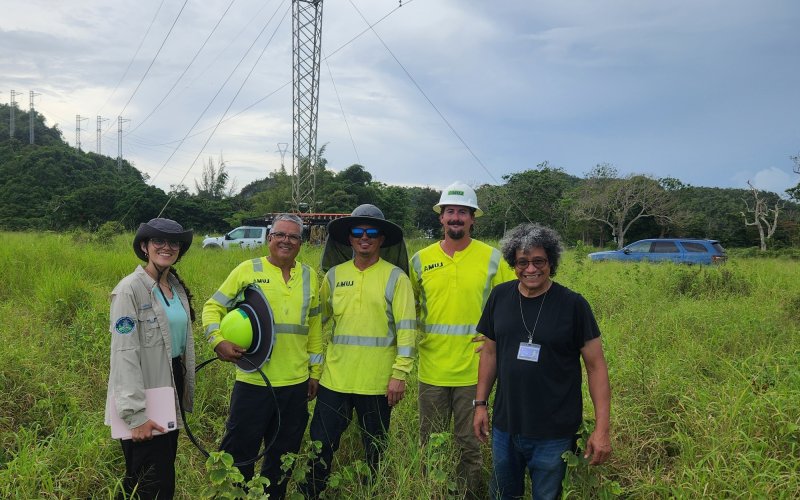UAlbany Researcher, Grad Student Team Up to Improve the Resiliency of Puerto Rico’s Power Grid

By Mike Nolan
ALBANY, N.Y. (Aug. 27, 2024) — University at Albany graduate student Bianca Méndez Cruz has seen firsthand how vulnerable Puerto Rico’s electrical grid is to extreme weather.
A native of Arecibo, a city on the northern coast of Puerto Rico, Méndez Cruz’s family lost power for a month in 2017 after Hurricane Maria left much of the island’s electric infrastructure in ruin. She had friends and family who were without electricity for closer to a year.
The experience motivated her to pursue an undergraduate degree in geology at the University of Puerto Rico at Mayagüez (UPRM), where she learned more about how these powerful storms form and their hazardous impacts.
She’s now leaving home to help ensure Puerto Rico is more prepared in the future.
“Thankfully, my hometown did not receive as much damage as others did when Maria made landfall,” said Méndez Cruz, now a first-year PhD student in UAlbany’s Department of Atmospheric and Environmental Sciences. “Seeing how badly the storm devastated our island’s power grid inspired me to learn more about extreme weather and the solutions to better protect our infrastructure in the future.”
Reconstructing Extreme Weather Events
While studying at UPRM, Méndez Cruz connected with Jorge González-Cruz, a Puerto Rico native and Professor of Empire Innovation at UAlbany’s Atmospheric Sciences Research Center, through her undergraduate mentor Stephen Hughes.
González-Cruz is a coastal-urban climatologist with a specific focus on helping vulnerable island communities better prepare and respond to climate extremes. He’s currently leading a federally funded project to reconstruct past major weather events in Puerto Rico and gather new data that can help improve the island’s power grid resiliency.
The collaborative project includes researchers from UAlbany, New York University and UPRM, along with leaders at LUMA Energy, who operate the island’s power grid for the Puerto Rico Electric Power Authority.
Méndez Cruz was recruited to join the team over the summer.
“Bianca and I connected during one of my visits to UPRM,” said González-Cruz. “Her interests and motivators for getting into this work perfectly aligned with the type of student researcher that I was hoping to recruit for our team. She’s already played an instrumental role in the early stages of this project. We’re thrilled to continue working with her, now as a UAlbany student.”
Boosting Grid Resilience
In his previous work, González-Cruz led a collaborative project to reconstruct the impacts of Hurricane Maria on Puerto Rico. This was done through a combination of geophysical models, engineering models of both the power and water grid, reviews of damage reports, and the use of socioeconomic information to determine impacts on low-income communities.

Using the new federal funding, the same researchers have joined again not only to reconstruct other major past weather events in Puerto Rico, but also to gather new data on the island. This will be done by installing sensors that can monitor the safety of Puerto Rico’s transmission towers when exposed to extreme weather events.
By reconstructing past storms, collecting new data on Puerto Rico’s transmission towers and using machine learning algorithms, the research team plans to develop new predictive modeling that can anticipate risks of disruption to the island’s power grid during extreme weather events.
“The sensors that we’re installing are sort of like giant research labs that will offer valuable information in real-time about how the power grid is impacted by extreme weather events,” said González-Cruz. “It is a first-of-its-kind tool that will support emergency managers and utility leaders with response time to power outages and strengthen Puerto Rico’s vulnerable infrastructure.”
Méndez Cruz joined the research team in August, prior to her start as a UAlbany student, to scout locations and begin installing the sensors. She's returning to Puerto Rico, with González-Cruz, in mid-September to continue the field work.
“We’re already reviewing data from the first sensors that were installed,” Méndez Cruz said. “I feel very privileged to support this work, especially knowing it will help my family and friends who have been so severely impacted by weather disasters.”
Coastal Climate Network
In February 2023, Gonzalez-Cruz joined the Caribbean Climate Adaptation Network (CCAN), which seeks to connect scientists with community and government stakeholders in Puerto Rico and the U.S. Virgin Islands to better prepare and respond to climate extremes.
He believes his research will be transferable to other island communities, along with vulnerable coastal areas in the U.S.
“Puerto Rico is serving as our testbed,” Gonzalez-Cruz said. “Once our modeling approach is proven to be effective, we believe it will open up the door for exploration in other coastal communities that are vulnerable to increasingly frequent and extreme weather.”
Along with Méndez Cruz, a graduate student from New York University and undergraduate students at UPRM are supporting the project’s work this fall.




